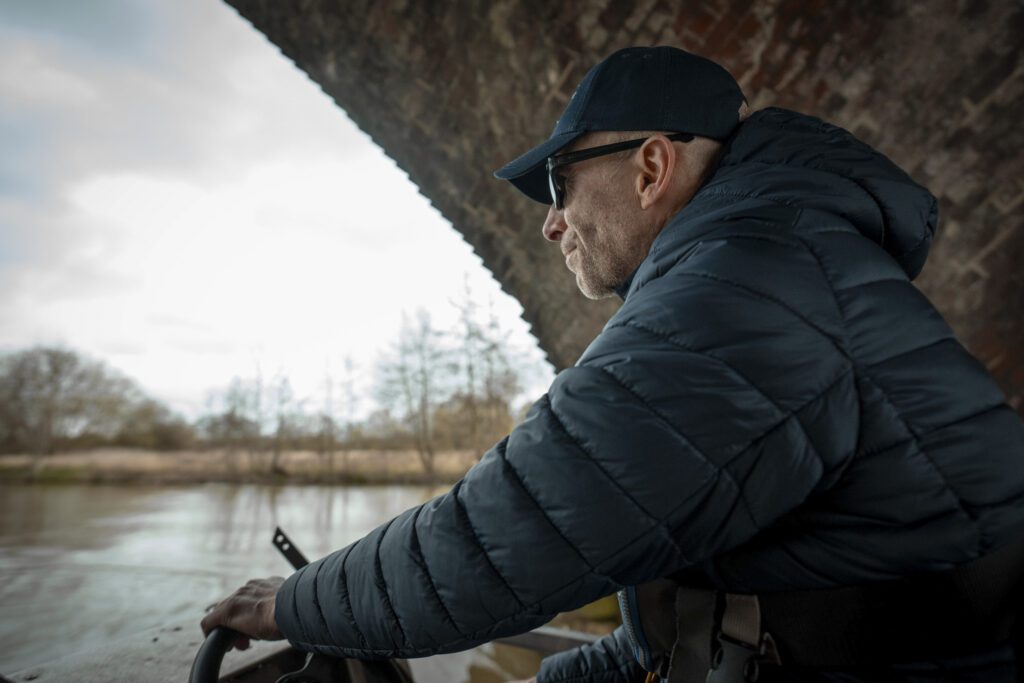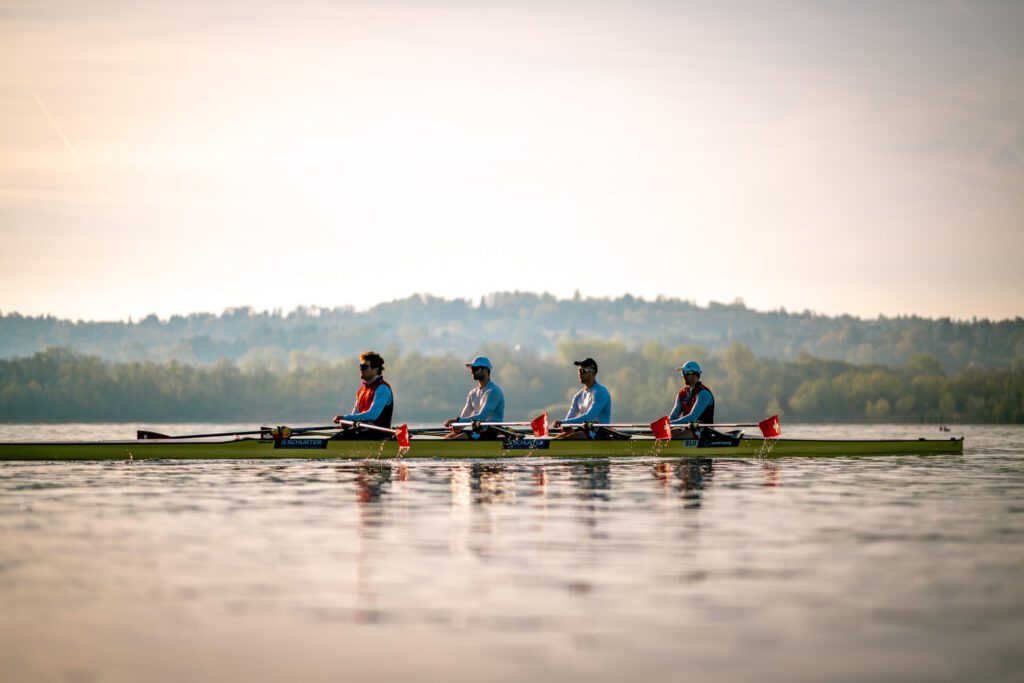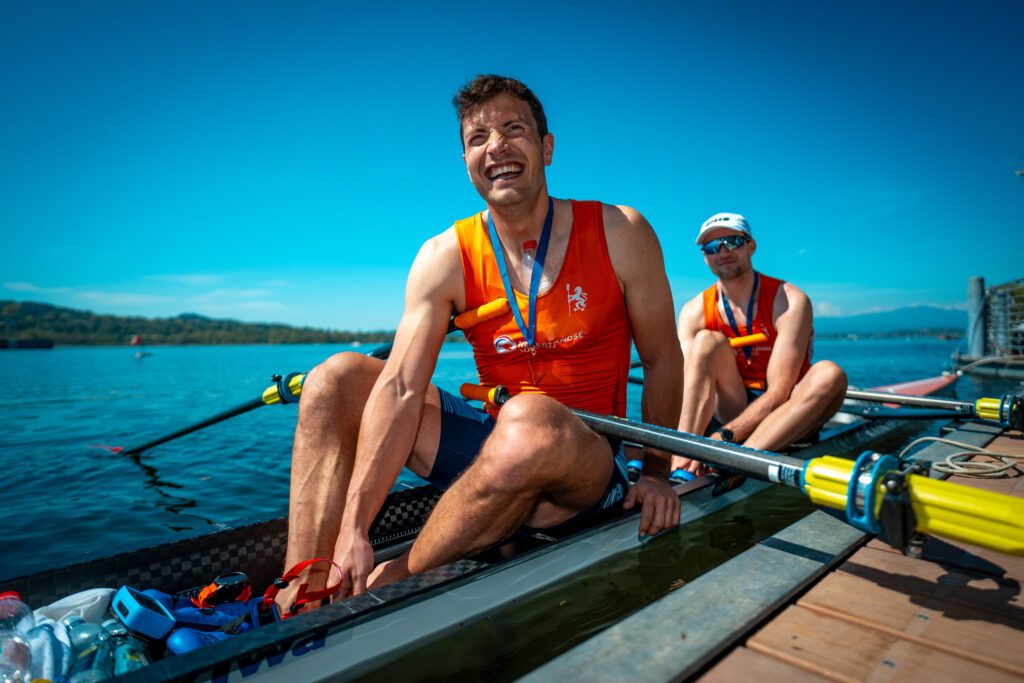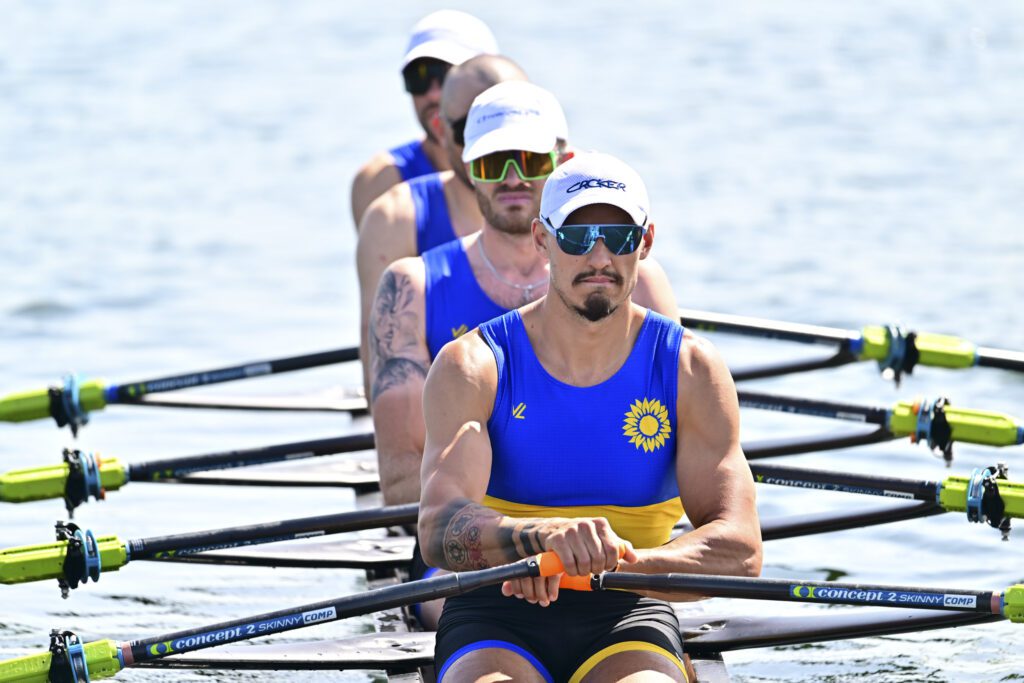Of all the challenges facing double Olympic champion James Cracknell OBE when he decided to trial for the 165th Cambridge Blue Boat, the last one you might have expected was that a familiar figure could pop up in the umpire’s launch to spoil his day. Former crew-mate and partner in Olympic crime Sir Matthew Pinsent has for some time been a fixture on the panel of officials adjudicating the Boat Races, and since it was Cambridge’s turn to choose from the set of Dark Blue referees, it was a possibility.
“Matt texted me and said ‘am I umpiring you?’ and I said ‘I hope not!’ — because he’s umpiring Isis-Goldie”, revealed Cracknell, chatting with a round table of journalists in the Goldie boathouse earlier this week. He was sitting under the 159 Blue Boat honour boards — CUBC are somewhat behind in getting the signwriting up to date — which adorn the room’s pitched ceilings and to which he hopes to add his name, preferably with a ‘WON’ line at the top, rather than ‘LOST’.
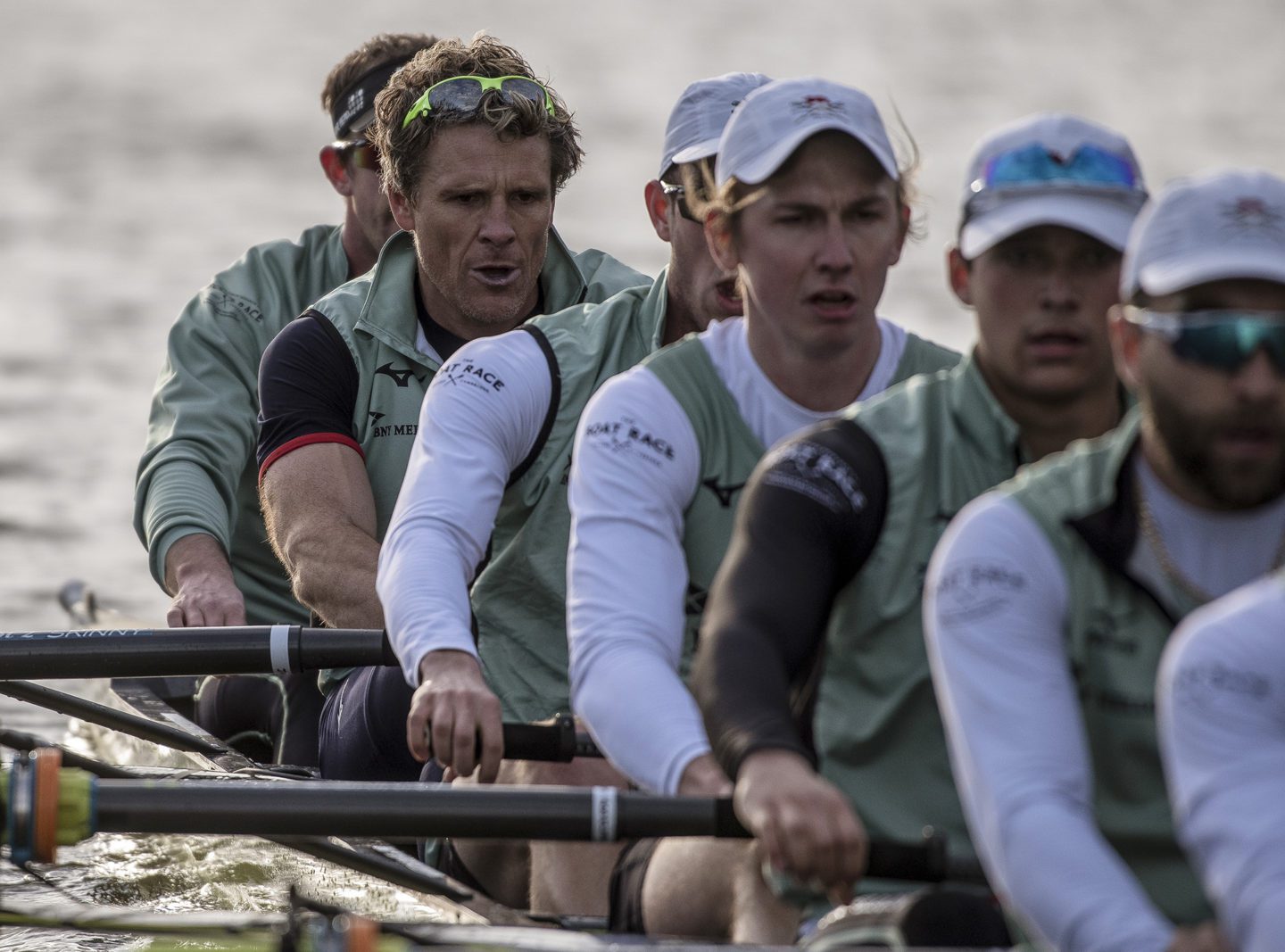
Photo Cracknell during training in Ely in February
Credit Benedict Tufnell
So Cracknell will only be seeing his erstwhile pairs and fours partner if he’s binned from the Light Blues’ top crew, although he’s understandably nervous that anything can happen, given that they have yet to race their first proper fixture, rescheduled against Brookes for this coming Sunday after the high winds last week. “I think Matt is so straight down the middle that he’ll be annoyingly neutral”, explained Cracknell. “And he would disqualify someone, too.” Then a wry smirk comes across Cracknell’s face as he considers the man with whom he shared so many races, meals, training hours and in-jokes over a long and illustrious international career. “And I would not be inclined to listen to him. Which means I’m quite disappointed he’s not there. But then, I also know he’d disqualify me, so….” — and there’s an amused shrug. “It’s probably best that I’m down the other end.”
The other end of the boat, that is. Cracknell has bagged — barring late changes — the two-seat of the Light Blues’ top crew, after a busy year which has seen the 46-year-old return simultaneously to full-time education 25 years after writing his last student essay and to full-time rowing training 14 years after retiring. From the outside, it does look like a mildly vainglorious bid to recapture youthful success, and rowers up and down the country hold a range of views on the wisdom of the attempt. But he’s quick to explain that there was a lot more to the decision, based partly on his recent work for the independent right-wing think tank the Centre for Social Justice, and interest in a politically active career.
“The thing I still miss most is waking up in that week and that day and being in the adrenaline again”
James Cracknell
“I was doing quite a lot of work with public health and non-communicable disease, and policy change”, he explains. “A lot of it’s about behavioural science and how we have learned behaviours, and to make sure policies are written for people to have interventions to make the right decisions. It’s no good writing policies for food we should eat when in reality 20% of the country only have a toaster, a kettle and a microwave to cook with.” Realising that an academic background would lend him more weight, he decided to go back to college to support this work, which led to his application to study for a ten-month MPhil in human evolutionary studies at Peterhouse College.
There’s no doubt that rowing will have been an undercurrent — he admits with a grin that he could easily have done the same course at a couple of places closer to home in London — but he’s rationalised the choice of Cambridge with perfect self-aware logic. “I wouldn’t trust myself to study that well in my normal environment with family and mates around”, he says. “And then there was the chance to come here and combine it with doing the Boat Race and seeing if I can still cut it. The thing I still miss most is waking up in that week and that day and being in the adrenaline again — it’s that race situation you can’t recreate in any other environment.”
And the academic side is real: Cracknell was also offered a place at Oxford, says his coach Rob Baker, albeit on a different course, but is clearly thoroughly enjoying his chosen area. “My first degree was selected as what was the least hours in a university close to rowing, whereas here it’s something I really want to study.” He’s now planning a dissertation on fluctuating asymmetry, ie the phenomenon of how the physical symmetry of the mates we choose relates to their genetic health and life events, and talks enthusiastically about “being dragged down wormholes of academic stuff, that I never thought would happen” — an experience he likens to becoming sucked into ‘inappropriate internet sites’ while chasing links on the web. However, when asked whether he’d choose a win in the Boat Race or a distinction in his dissertation, he ruefully admits he isn’t at the top of the class. “I’d say if we’re three lengths down at Barnes Bridge I’ve got more chance of winning, right now.”
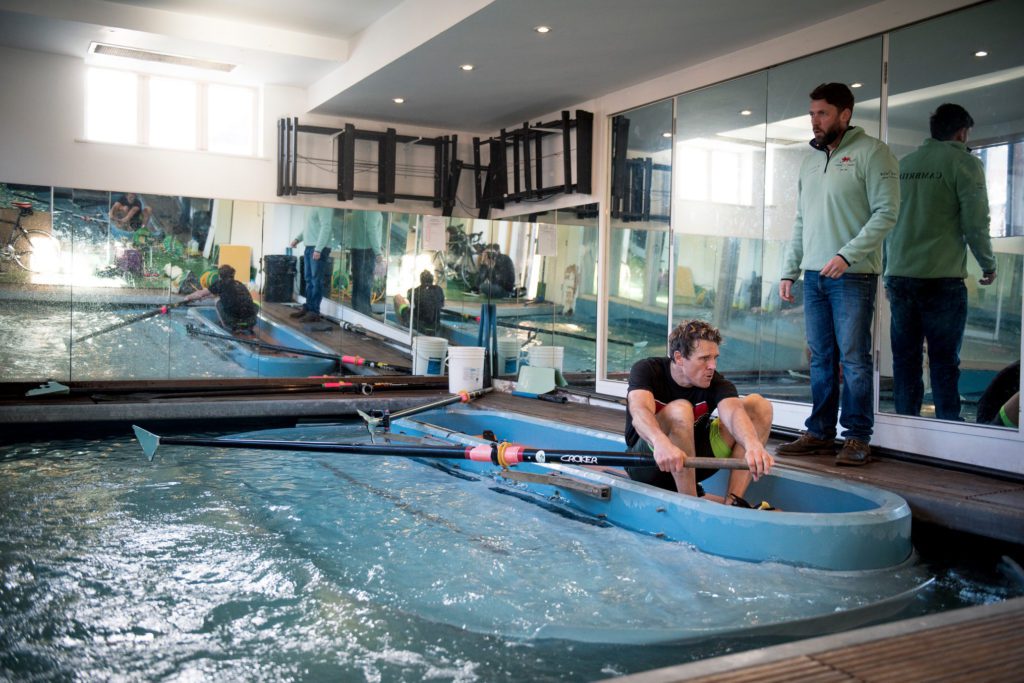
Photo Cracknell fine tunes his technique with CUBC coach Rob Baker
Credit Benedict Tufnell
While we talk, another motivation for this ambitious year does emerge. In 2010 Cracknell suffered a well-publicised accident while cycling Ride America. He was hit from behind by a homicidally careless truck, and suffered brain damage to his frontal lobe. His doctors made quite a few predictions about his future health which Cracknell has gleefully defied over the last nine years: perhaps they didn’t realise the best way to spur him on was to give him a reason to prove them wrong. “People’s perceptions are still ‘are you ok?’ For me part of coming here was, if I could achieve academically and sporting-wise, people will stop asking that.”
He did find his ability to plan and organise was impaired in the early period after the accident, and wonders if he would have been able to manage this Cambridge year back then. But he also wonders if being told that his organisational abilities would be affected by the brain damage became a self-fulfilling prophecy. “They do say it, so maybe it makes you think that way.” As a result he’s passionate about not setting limits. “It doesn’t have to be an accident, it could be anything, but especially this stage in life, don’t let anyone else set things you can’t do. I think a lot of us are told that by people, and if you believe it then you’re never going to be able to do what you can.”
“Looking back now I realise how little I knew about the race while commentating on it.”
James Cracknell
In practical terms this year has thrown up a series of unexpected challenges, from discovering that none of his team-mates were alive when he went to watch a Kurt Cobain gig as a 1990s student, or learning about Tinder, to turning up at his first lecture with especially-sharpened pencils and paper, only to find the rest of the cohort taking notes on their laptops. As he points out, “the internet wasn’t around when I first went to university”. Unused to a full academic schedule, he was left behind a few times in the early weeks, when his squad mates left the Ely boathouse to rush back for morning lectures, before he had finished changing. As a full-time student he’s living in Cambridge, away from his West London home with wife Bev and their three kids, but has managed a few nights with the family when CUBC have visited the Tideway on their many training outings to accustom newcomers to the bumpy water.
“When the Tideway wind goes against tide, it’s proper choppy. Some of the lads here have come from abroad, they go ‘why are you rowing on this rubbish’, but that’s where we’re racing. You have to get used to water flying around, and you’ve got pumps built in.” The man who rowed the Atlantic with Ben Fogle is pretty relaxed about unpredictable water. “There’s no guarantee you’re going to have a clean row at all. You’ve got to be prepared that at one point you’re going to catch a boatstopper and suddenly go from half a length up or level to half a length down, and not let that do your head in. But the conditions are the same for both crews.”
“I’ll be really disappointed if we choose a side where I don’t get to clash”
James Cracknell
It’s fair to say that taking part for real has changed some of Cracknell’s views of the odd and historic event which is the Boat Race. He commentated on and wrote about it many times, but now he’s heard the tales of former Blues. “Looking back now I realise how little I knew about the race while commentating on it. It’s the subtleties, the old boys come back and talk about it, at key points what they were thinking. The amount you have to practice: getting onto the stake boat and having a 5mph current running underneath you. You can muck it up by the first stroke of the race: it’s like getting dropped onto a treadmill when it’s running already.” He also appreciates now the complexity of preparing a crew with wildly differing levels of experience. “In the Olympics everyone’s pretty much the same sort of area of racing, whereas here you’ve got people who started rowing at university, through to Natan [Wegrzycki-Szymczyk] who’s raced for Poland at the Olympics. He’s very racing-aware but clashing is not his natural forte. But I’ll be really disappointed if we choose a side where I don’t get to clash.” Fortunately they’re rowing on opposite sides, so Cambridge will clearly be hoping to get the Mortlake station, to keep both their Olympians happy.
Cracknell has also changed his mind about coxes — for this event, at least. “When I raced the Olympics one of us would steer with our foot. Normally a cox is a 50-kg bag of sand, if you can do their job with your foot they’re not that useful. But on the Tideway they earn their keep probably more than anyone. You’ve got to have real faith in them, and communication between stern pair and the cox is crucial. But the people up the bows have got to be switched on as well. Especially where I’m rowing, I’m one of the last two guys to see if Oxford are going to break clear so if there’s going to be a make or break move it will come from one of either me or Dave [Bell] shouting ‘it’s going to be now or never’”.

Photo CUBC training in Ely
Credit Benedict Tufnell
It’s fascinating to hear both Cracknell and Baker on the changes the Olympian has needed to make to adjust to elite racing in 2019. Having famously pursued endurance challenges in cycling, running, swimming, canoeing and ski-ing in addition to that trans-Atlantic row, in Baker’s view the athlete who ran a 2hr 43minute marathon in 2017 could row at a high intensity all day long. But Cracknell no longer has the power he had fifteen years ago after a long non-stop international rowing career, so he’s done a lot of strength training to rebuild it, and worked on technique. “I don’t think the boats I was in previously were ever held up as technical beacons of rowing,” says Cracknell, “and it has moved on. I’ve had to adapt the way I row, just the way the rhythm flows. To be honest we’re not as strong as the average strength of the fours I rowed, and the range [of ability] is much bigger, so you have to have that bullet-proof rhythm that everyone can hook onto, not rely [on power] to get yourself out of trouble. We do a lot of ergos where they link them all together and — um — I’m not always in time… A lot of what used to work for me, it’s not much use here. Also rowing an eight is such a quick-moving boat, so much is done before the ninety-degrees, that I’ve learned a huge amount and it’s only now that I’m picking it up in the right way.”
To Baker, it’s pointless comparing his two-seat, nicknamed ‘Uncle James’ to the crew, to other 46-year olds. “Andrew Cotter the race commentator was saying we all feel ourselves slowing up when we get into our forties, but we weren’t all James Cracknell in our twenties and thirties. He isn’t producing the scores he did when he was 25-30 but he was one of the top gold medallists then, not just getting gold medals, but one of a handful of people in the world, so it’s a very high bar he starts from.” What the returner does have is the same fearlessness he showed when younger. “I don’t think James is afraid of hurting himself, or ever has been.” That’s lucky, since this year Baker started training with a suggestion that anyone who stopped on the erg test which formed the first session, should not bother coming back.
“I thought oh great, I’ve spent 15 years avoiding erg tests”, said Cracknell. “But straight away he’s got to find out who’s prepared to hold their hand in the fire, and if you’re not, it’s better to find that out early on.” Crackers duly pulled himself to pieces — he can’t remember finishing one of the early tests — “but I didn’t stop at least, though I didn’t set the world on fire.” For the man who was used to a four-year campaign, seven months has gone very fast. “You do the first couple of months, then you realise who you’re fighting against for your seat, and then you support each other, so it’s been really interesting. I’ve learned a lot about how to work in this environment.” He has worked out how to measure his older body’s recovery carefully, and has tackled the pain barriers with his usual equanimity. “I spent a long time avoiding lactic acid, so I’ve had to become friends with it again, and I don’t like it as much.”
However he has worked hard to his raw strength and technique, and seems to have timed his peaking with the canny accuracy of experience.
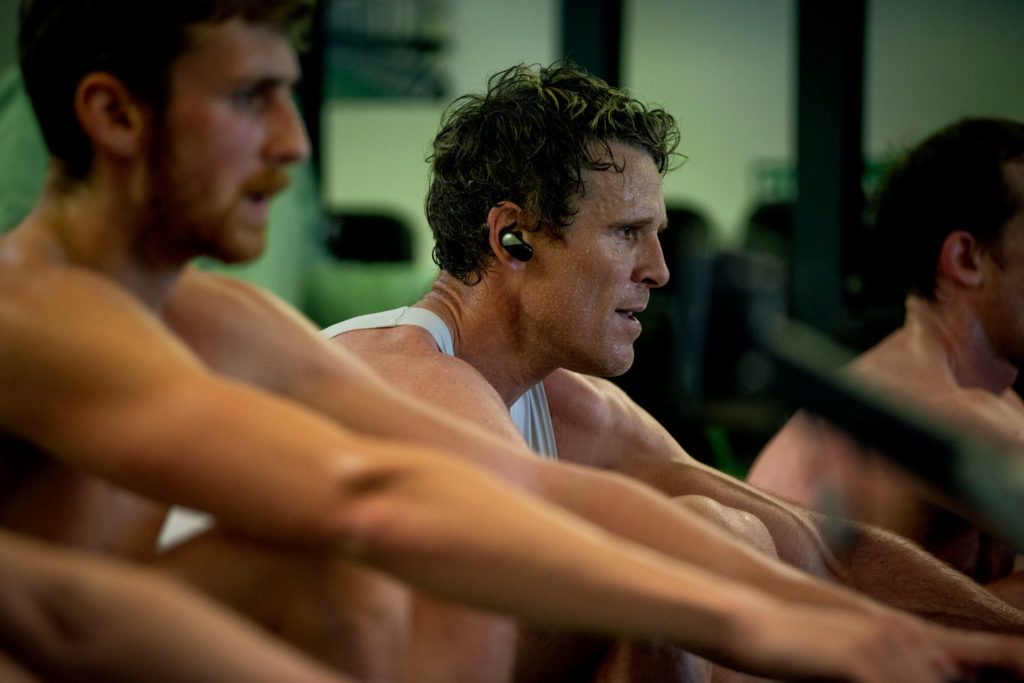
Photo Morning erg training in Goldie Boathouse
Credit Benedict Tufnell
It’s a far cry from the many years when he’d rock up with a stacked international-standard Leander first eight to race one or more of the men’s Blue Boats a week or two before the Eights Head. “Generally we’d do a long piece, and our crew would be able to get a length ahead then fall apart because we had no rhythm, and get rowed down. Then the second piece was a lot shorter at which point we’d hoof it off the start and crash into them. You realise how far advanced the Boat Race crews are for this stage in the season, it’s a different level.”
The impact of Cracknell’s presence on Cambridge is appreciated by President Dara Alizadeh. “James has been great, a lot of what made him good early on in his career, he brings similar things now”, says Alizadeh. “He’s very intense, he brings the fire in everything he does, and he also brings a good amount of insight. He has good feel of what’s going on, so when he says he feels something, guys really buy into that and we can make an adjustment.”
He also brings experience, as someone who has not only won, but won as heavily fancied favourite, something which has never scared either Cracknell or his illustrious former team-mates. You can hear the Olympic experience ringing through as he contemplates April 7th. “Our base level should be the best we’ve done in training, rather than expecting something we’ve never done before. I think that’s what I’m trying to get across to the lads, that it’s about what we’ve done, and using the adrenaline of the occasion to lift you up rather than go out thinking we’ve got to do something we’ve never done before. That the most relaxed you’ll feel in the preceding week is when you put your hands on the boat and you’re off and doing it — you’re going to feel shit beforehand.”
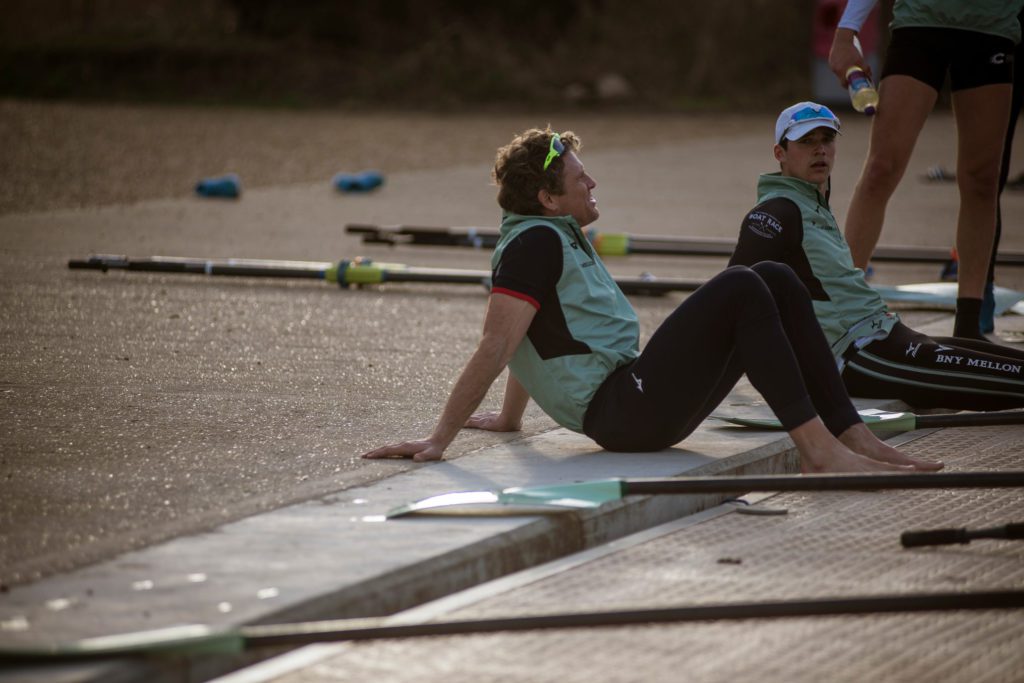
Credit Benedict Tufnell
Two years ago he told a running magazine “I can hold on when it gets horrible”, and that may be Cracknell’s best gift to the Light Blues. If the guy who is old enough to be dad to most of them isn’t giving up but is shouting for more, who would dare fold? “He gets everyone geed up, he can get guys motivated,” says Alizadeh. And Cracknell gets how this peculiar endurance sprint combination works. “This race probably more than any other you’ve got to have each other’s back. Because there’s going to be a time when you’re doing something that is mentally wrong with three miles left. Because if you don’t do it then, you’re going to lose.”
